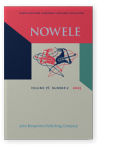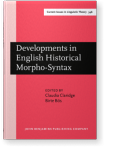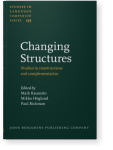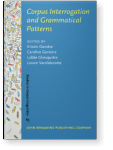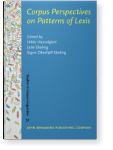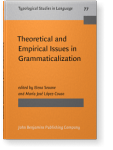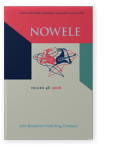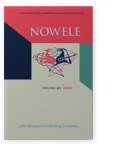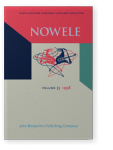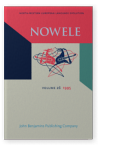Günter Rohdenburg
List of John Benjamins publications for which Günter Rohdenburg plays a role.
2023 End-weight at its most dynamic: Prosodic prominence as a factor promoting morphophonological marking NOWELE 76:2, pp. 153–202 | Article
This contribution supports and extends the principle of end-weight, first formulated by Quirk et al. (1972) to describe the tendency of heavy constituents to appear late in a sentence. Developing this principle further, we argue that it favours the addition of (functionally non-neutral)… read more
2019 Further explorations in the grammar of intensifier marking in Modern English Developments in English Historical Morpho-Syntax, Claridge, Claudia and Birte Bös (eds.), pp. 269–286 | Chapter
Picking up on earlier analyses, this paper explores a number of further issues bearing on the replacement of unmarked intensifiers by suffixed ones. While the evolutions of individual intensifiers may vary enormously, almost all grammatical constraints on intensifier marking can be accounted for in… read more
2019 The rivalry between far from being + predicative item and its counterpart omitting the copula in Modern English Developments in English Historical Morpho-Syntax, Claridge, Claudia and Birte Bös (eds.), pp. 287–308 | Chapter
Distinguishing between several subtypes of the frame far from + optional and recessive being + predicative phrase, this paper charts the evolution of the rivalling variants in British and American English over the last few centuries. The paper reports on two major findings. First, in line with the… read more
2018 The use of optional complement markers in present-day English: The role of passivization and other complexity factors Changing Structures: Studies in constructions and complementation, Kaunisto, Mark, Mikko Höglund and Paul Rickman (eds.), pp. 129–149 | Chapter
This paper reports on the results of a corpus-based study exploring several major types of omissible complement clause markers. Throughout, the distribution of rival variants with or without these markers is accounted for in terms of the Complexity Principle correlating processing complexity and… read more
2018 Chapter 3. On the differential evolution of simple and complex object constructions in English Explorations in English Historical Syntax, Cuyckens, Hubert, Hendrik De Smet, Liesbet Heyvaert and Charlotte Maekelberghe (eds.), pp. 77–104 | Chapter
This article surveys the evolution of object structures in Modern English. In the area of simple constructions, a vast range of prepositional objects and adjuncts have been replaced by direct objects, thus making the latter category considerably more abstract. By contrast, in the area of more… read more
2014 Syntactic constraints on the use of dual form intensifiers in Modern English Corpus Interrogation and Grammatical Patterns, Davidse, Kristin, Caroline Gentens, Lobke Ghesquière and Lieven Vandelanotte (eds.), pp. 131–149 | Article
Recent work on comparative variation has highlighted two major syntactic environments encouraging the choice of the more explicit more-variant, a) the use of non-attributive rather than attributive adjectives and b) the use of complemented rather than uncomplemented (non-attributive) adjectives (cf. read more
2013 The construction cannot help -ing and its rivals in Modern English Corpus Perspectives on Patterns of Lexis, Hasselgård, Hilde, Jarle Ebeling and Signe Oksefjell Ebeling (eds.), pp. 113–132 | Article
This paper describes the history and present status of a family of constructions containing two older (obsolescent and recessive) members, cannot choose but + bare infinitive and cannot but + bare infinitive, and two younger ones, cannot help -ing and cannot help but + bare infinitive. It is shown… read more
2008 On the history and present behaviour of subordinating that with adverbial conjunctions in English Theoretical and Empirical Issues in Grammaticalization, Seoane, Elena and María José López-Couso (eds.), pp. 315–331 | Article
2003 Aspects of grammatical iconicity in English From Sign to Signing, Müller, Wolfgang G. and Olga Fischer, pp. 263–285 | Article
